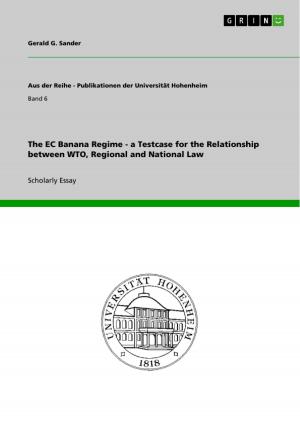Edgar Allan Poe's Literary Theory and its Application in 'The Fall of the House of Usher'
Nonfiction, Entertainment, Drama, Anthologies| Author: | Felix Kremser | ISBN: | 9783640549382 |
| Publisher: | GRIN Publishing | Publication: | February 26, 2010 |
| Imprint: | GRIN Publishing | Language: | English |
| Author: | Felix Kremser |
| ISBN: | 9783640549382 |
| Publisher: | GRIN Publishing |
| Publication: | February 26, 2010 |
| Imprint: | GRIN Publishing |
| Language: | English |
Seminar paper from the year 2009 in the subject American Studies - Literature, grade: 1,3, Ernst Moritz Arndt University of Greifswald, course: North American Short Stories, language: English, abstract: Edgar Allan Poe's name is related to the American short story like none other in the history of American Literature. While Washington Irving is commonly seen as the creator of the short story, Edgar Allan Poe is regarded as the first to have realised its potential and the first to have created an aesthetical theory of the short story. This theory though, especially Poe's depiction of the skilful artist and his/her perfect way of creating art, gave rise to many heated discussions, which strongly shaped the image of Poe. Thus he is likely to be seen as the cold-blooded, emotionally unaffected author who creates art on demand, contriving compositions with an unparalleled precision and brilliancy. Many critics therefore rather based their criticism on the life and the person of Edgar Allan Poe, instead of his contributions to the development of literature. This work strictly wants to avoid to draw any populist parallels between the author Poe and the person Poe. The first part of this term paper therefore deals with Poe's literary theory as such. I will focus mainly on Poe's major concerns of effect and the genres of poetry and prose. Furthermore I will pose the question, what is the actual matter of Poe's theory, is it a profound concept or just a vague and hasty response to Emerson's 'The Poet', with the mere purpose of provoking his contemporaries and thus to get attention? Since the formulation of a theory always raises the question of its applicability, especially on the part of its originator, the second part will scrutinise to what extent Edgar Allan Poe stuck to his own principles. Is there a discrepancy between theory and practice in the work of Edgar Allan Poe, and if so how can this be explained? His short story 'The Fall of the House of Usher' will provide the paradigm, as it is in general, and even by Poe himself, considered one of his masterpieces. It is not the intention of said scrutiny to develop an overall-interpretation of the story, furthermore, the presented conclusions, drawn from the story's symbolism, do not claim exclusiveness, they rather present possible ways of reading next to which other perspectives can coexist with just the same plausibility.
Seminar paper from the year 2009 in the subject American Studies - Literature, grade: 1,3, Ernst Moritz Arndt University of Greifswald, course: North American Short Stories, language: English, abstract: Edgar Allan Poe's name is related to the American short story like none other in the history of American Literature. While Washington Irving is commonly seen as the creator of the short story, Edgar Allan Poe is regarded as the first to have realised its potential and the first to have created an aesthetical theory of the short story. This theory though, especially Poe's depiction of the skilful artist and his/her perfect way of creating art, gave rise to many heated discussions, which strongly shaped the image of Poe. Thus he is likely to be seen as the cold-blooded, emotionally unaffected author who creates art on demand, contriving compositions with an unparalleled precision and brilliancy. Many critics therefore rather based their criticism on the life and the person of Edgar Allan Poe, instead of his contributions to the development of literature. This work strictly wants to avoid to draw any populist parallels between the author Poe and the person Poe. The first part of this term paper therefore deals with Poe's literary theory as such. I will focus mainly on Poe's major concerns of effect and the genres of poetry and prose. Furthermore I will pose the question, what is the actual matter of Poe's theory, is it a profound concept or just a vague and hasty response to Emerson's 'The Poet', with the mere purpose of provoking his contemporaries and thus to get attention? Since the formulation of a theory always raises the question of its applicability, especially on the part of its originator, the second part will scrutinise to what extent Edgar Allan Poe stuck to his own principles. Is there a discrepancy between theory and practice in the work of Edgar Allan Poe, and if so how can this be explained? His short story 'The Fall of the House of Usher' will provide the paradigm, as it is in general, and even by Poe himself, considered one of his masterpieces. It is not the intention of said scrutiny to develop an overall-interpretation of the story, furthermore, the presented conclusions, drawn from the story's symbolism, do not claim exclusiveness, they rather present possible ways of reading next to which other perspectives can coexist with just the same plausibility.















